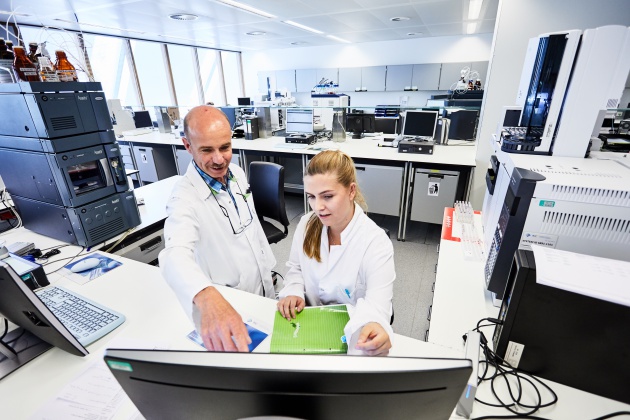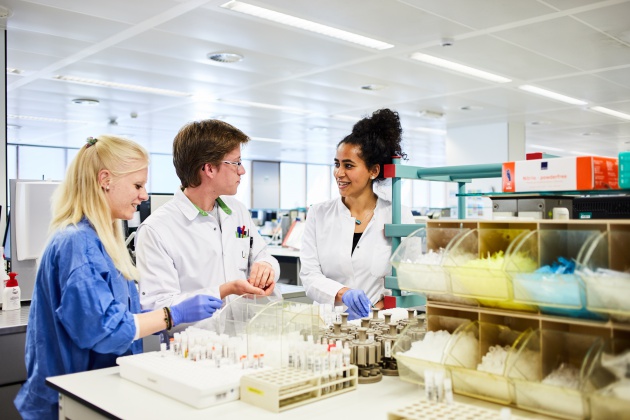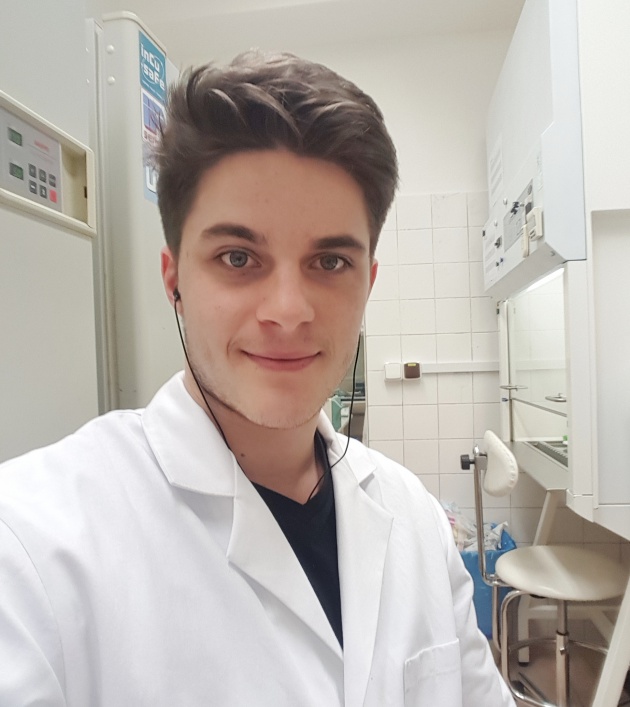Master of Science in Biomedical Research
Biomedical scientists try to trace back the cause of diseases which opens up possibilities for prevention and the development of new diagnostic
methods and treatments that do not only reduce the symptoms but really cure the patient. Especially the last aim is very challenging and can only be
obtained by international collaboration between different scientific disciplines working at the crossroads of biomolecules, in vitro and in vivo
preclinical research, clinical trials and patient care.

Join the multidisciplinary quest into cures waiting to be discovered
The master of science in Biomedical Research is aiming to train master students in biomedical research in a strong multidisciplinary environment
at the Brussels Health Campus where biomedical scientists work together with clinicians and colleagues trained in other disciplines such as
pharmaceutical sciences or bio-engineering.
The Brussels Health Campus has an excellent reputation in innovative biomedical research which is reflected by the presence of 10 research
clusters on the campus.
• Biomedical Imaging and Medical Physics
• Cardiovascular Diseases
• Development, Ageing & Pathology
• Diabetes,Transplantation and Pathology
• Liver and Cell Biology and Toxicology
• Neurosciences
• Oncology
• Pharmaceutical Research and Data Technology
• Public Health
• Reproduction - Genetics & Regenerative Medicine
Want to know more about this education?
Book your info session!Any questions?
Don’t hesitate to write us an email. We’d be happy to help you on your way!
Contact us
Becoming a biomedical researcher
The educational programme is very practical and is strongly focused on academic scientific training. We work in small groups and offer an interesting educational programme for open minded critical thinkers. Most professional skills are obtained during the two internships and the writing and defence of a master thesis. The first internship takes four months in a research lab of the VUB or elsewhere. The second takes 8 months allowing you to work yourself through almost all aspects of a scientific research project and to become an independent scientist. These internships and the relatively high number of elective courses will allow you to develop your own research track. The short internship in combination with the research project in the second year allows you to obtain a rather broad overview of biomedical research and at the same time get specialised in one research area and become acquainted with all aspects of scientific research.

Degree
Plan
Spread your wings
We have collaborations and exchange agreements with other universities allowing students to go abroad for internships within the frame of the Erasmus programme. The two short internships can for instance be combined to go for one internship at a foreign university. During the Research Project in the second master year you will also learn to write a project proposal. When you perform well and are eligible for submitting a PhD-project proposal this could result in the start of your PhD track at the VUB or elsewhere.
Programme outline
The master of science in Biomedical Research is structured over two academic years. In the first semester a number of compulsory courses (e.g. academic English for life sciences, laboratory animal sciences and biostatistics, bioethics) will provide you with the required scientific skills and ethical awareness to perform as a professional internationally orientated researcher.
In the second semester, you will start writing a review paper on the research topic of your second internship and you will follow a laboratory internship of four months. The optional courses, in total 24 ECTS, can be followed in all four semesters of the programme. The master thesis will be based on the scientific results obtained during the second internship. The thesis defence will take place at the end of the fourth semester and comprises an oral presentation followed by a discussion before a jury.
Study credits
ECTS (European Credit Transfer System): 1 credit represents 25-30 hours of study activity
AFTER GRADUATION
A master in Biomedical Research offers excellent career opportunities.
The future is yours
In the last 10 years, 56% of our graduates started a PhD track and 30-40% of the students found a job in biotech companies or the pharmaceutical industry. Belgium also offers great job opportunities in biomedical research, as it has the highest number of clinical studies per capita.

“It is so fascinating to see how all complex biological processes work together so meticulously, resulting in a functioning organism. This is why I chose to study Biomedical Sciences at the VUB.” Wito De Schrijver Currently PhD Student at the Epigenetics and Gene Regulation Laboratory of Monash University in Melbourne, Australia
Careercenter
THE VUB HELPS YOU TO MAKE YOUR FIRST STEP IN THE JOB MARKET WITH WORKSHOPS, NETWORKING EVENTS, JOB FAIRS, TIPS ‘N TRICKS FOR JOB INTERVIEWS. ALL AN AMBITIOUS STUDENT NEEDS!
First step in the market
Phd?
IF YOU WANT TO CONTINUE YOUR ACADEMIC CAREER, YOU CAN APPLY FOR A PHD POSITION AT THE VRIJE UNIVERSITEIT BRUSSEL. ALL YOU NEED IS A PROMOTER, RESEARCH SUBJECT AND SUFFICIENT FUNDING. ARE YOU UP FOR THIS CHALLENGE?
More info
Want to know more about our alumni?
More infoFollow the VUB
On LinkedInGeneral requirements
The Master of Science in Biomedical Research is open to holders of a bachelor degree in Biomedical Sciences.
For other academic bachelors, including Medicine, Pharmaceutical Sciences, Biochemistry, Biology and Life Sciences, equivalency will be evaluated based on scientific competences and skills of the students by our Steering Committee on Internationalization. At least a sufficient level of education in Biochemistry, Molecular and Cellular Biology, Microbiology, Immunology. Genetics, Physiology, Pathology, Pharmacology and Biostatistics are required. In certain cases, deficiencies can remediated by taking preparatory courses.
In addition to certified copies of diplomas, your CV, a motivational letter and two recommendation letters are required. The Steering Committee may also contact you by video conference to assess your qualifications and discuss your expectations of the master programme.
All applicants must provide evidence of proficiency in English. Prospective students can provide proof of sufficient knowledge of English as the language of instruction by meeting one of the following criteria:
- having a diploma of secondary or higher education where English was the language of instruction;
- having successfully completed secondary education organised (by an educational establishment accredited) by the Flemish, French-speaking or German-speaking Community;
- having successfully completed one of the following language proficiency tests corresponding to the Common European Framework of Reference with minimum level B2:
- TOEFL iBT with minimum level: 79;
- IELTS with minimum level: academic module 6.5;
- ITACE with minimum level: B2;
- Cambridge English Qualification Scale with the following minimal level: 170;
Certificates and other proof of language tests may not pre-date the first enrolment by more than five years.
Finally, admission to the master programme in Biomedical Research will depend on the evaluation by the admission committee.
For more details on admission requirements and application
Click hereTuition fees
The general tuition fee for the Master of Science in Biomedical Research is €939/year. Click below for a detailed overview of the tuition fees
Click here
Application deadline
Prospective students are advised to apply as soon as possible, even if they have not yet obtained their degree. Applications can only be submitted through our website www.vub.be/en/apply
- Students who require a visa (non-EU/EEA nationals) need to submit their application before April 1st.
- Students who do not require a visa must apply before September 1st.
- Note: if the proof of English proficiency is not ready before the deadline, you can always submit it later instead of missing the deadline